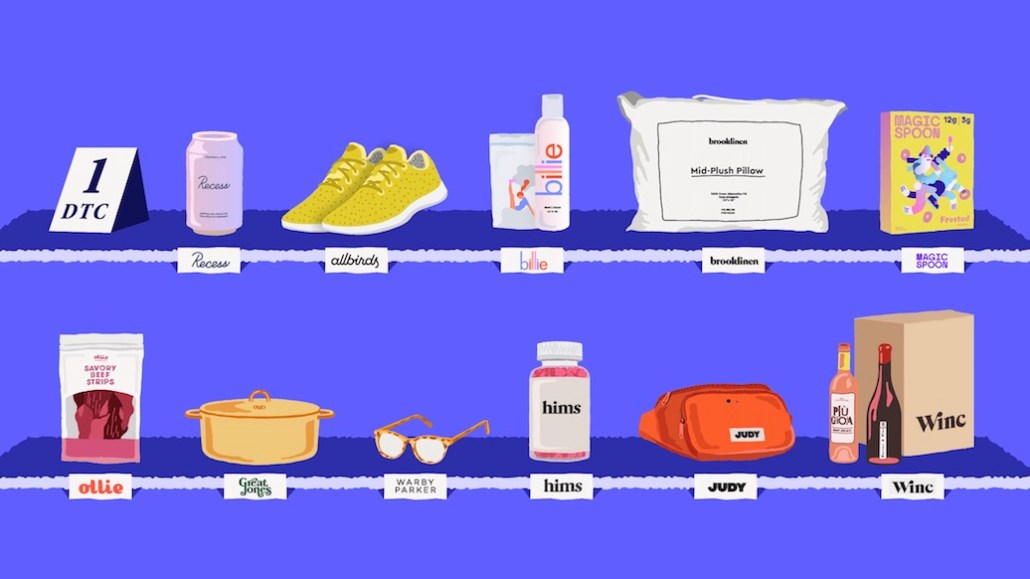Secure your place at the Digiday Media Buying Summit in Nashville, March 2-4

In March, the fundraising environment for direct-to-consumer startups was “downright frozen,” as Michael Duda, managing partner at hybrid accelerator agency and venture capital fund Bullish, put it. Now, March seems like a lifetime ago.
Over the past six months, many direct-to-consumer startups in categories ranging from home improvement, health and wellness and food have struck it big, reporting that their online sales have doubled or tripled while customer acquisition costs have decreased. Consumer investors are starting to close deals again, as they are looking to invest in the companies that will help power the e-commerce activity that is here to stay, according to four venture capitalists Modern Retail spoke with. And, investors that had previously soured on digitally-native consumer startups over concerns about high customer acquisition costs are starting to change their tune, given the huge growth these companies have seen over the past six months.
“I’ve never seen a more dead month in business than April of 2020,” said Duda. Then, “deal flow in May and June and July were as strong, if not better, than they were six months prior.” Things still aren’t totally back to normal. Duda said that Bullish, which has previously invested in Harry’s and Peloton, has done two deals in August after not having invested in any new companies since last year.
The consumer investors Modern Retail spoke with — many of whom focus on early stage or pre-launch companies — said that what they look for in an investment hasn’t changed during the pandemic. But there are some categories that they’ve become more interested in because they are betting that they are experiencing more than just a temporary ‘covid bump’ — that these categories will continue to see astronomical growth after the pandemic is over.
“Even prior to the pandemic, we’ve opened up our landscape beyond brands, and focused on e-commerce infrastructure and telehealth and online education,” said Logan Langberg, principal at Imaginary Ventures. “The last six months have just reaffirmed that those are great routes.”
Health and wellness is another area of interest, as investors are betting that the coronavirus pandemic has convinced consumers to take a more preventative approach to their health. Charlie O’Donnell, founder of Brooklyn Bridge Ventures, said that one of the few investments he’s made in the last few months is in Base, an at-home lab testing and app startup, geared towards customers who want help developing a plan to reach a health goal like get more sleep or reduce stress.
Some startups that have seen a huge drop in revenue, like Away and Rent the Runway, have been forced to raise new rounds during the pandemic. But, Andrea Hippeau, principal at seed and early-stage venture fund Lerer Hippeau, said that many of her firm’s later stage portfolio companies are waiting to raise money. At the beginning of the pandemic they either took drastic measures, or they raised some money from existing investors, to ensure they would have enough money to operate should they be a severe recession. “For a lot of our later stage consumer companies, I think the first quarter is going to be the really big fundraising [period] for them,” said Hippeau.
She also added that for many of them, “a lot of their metrics have gotten a lot better, organic acquisition is way up, and paid acquisition has been way down,” which should put them in a better position when they do need to go out and raise a new round. And, they may find more investors are interested in hearing from DTC startups again, if the e-commerce boom continues.
“A lot of investors who were saying they were either moving away from consumer or weren’t going to do consumer are looking at at it again,” said Hippeau.
“Fall of 2019, we had direct-to-consumer only companies that were raising capital at the Series A level, and they were being told like, ‘well we don’t know if the DTC model is viable, longterm,'” Duda said. Now, he said he’s seeing heard of some startups — if they have a plan to go into physical retail within two to three years — being told by other venture capitalists, “why would you do that, it is all direct-to-consumer now.”
“We are seeing a lack of VC contrarianism” he added.
Consumer investors are still betting more on an omnichannel approach, and say that a brand’s distribution strategy should be determined by what category they are in. “CPG investors that are investing in wholesale food have been handsomely rewarded,” said Langberg, pointing to the huge uptick in grocery sales during stay-at-home orders.
Although investors and startup founders have grown accustomed to Zoom pitches, some say that things won’t be completely back to normal until people are able to start meeting in person again. O’Donnell said that he feels like it’s gotten harder for first-time founders during the pandemic, who don’t have connections to top venture capital firms, to make those introductions.
“Deals will get done — but the bar is a little higher,” O’Donnell said.
More in Marketing

Thrive Market’s Amina Pasha believes brands that focus on trust will win in an AI-first world
Amina Pasha, CMO at Thrive Market, believes building trust can help brands differentiate themselves.

Despite flight to fame, celeb talent isn’t as sure a bet as CMOs think
Brands are leaning more heavily on celebrity talent in advertising. Marketers see guaranteed wins in working with big names, but there are hidden risks.

With AI backlash building, marketers reconsider their approach
With AI hype giving way to skepticism, advertisers are reassessing how the technology fits into their workflows and brand positioning.








